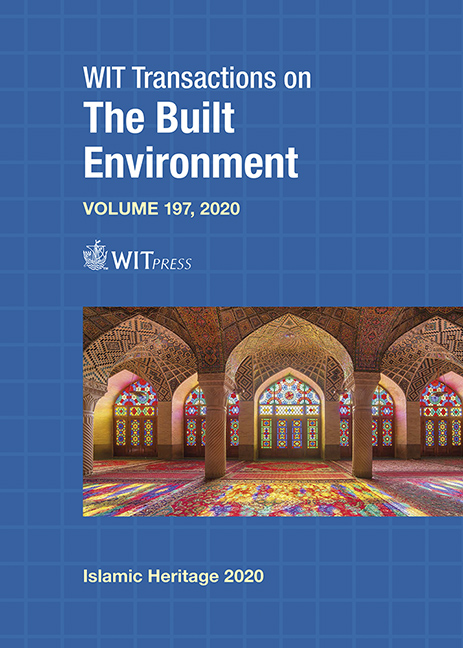CREATING A LOVABLE AND LIVABLE PUBLIC PLACE: A METHOD FOR AUGMENTING CONTEMPORARY BEHAVIOUR SETTINGS IN “WORLD HERITAGE LIST” HISTORIC JEDDAH (ALBALAD), SAUDI ARABIA
Price
Free (open access)
Transaction
Volume
197
Pages
10
Page Range
89 - 98
Published
2020
Size
347 kb
Paper DOI
10.2495/IHA200081
Copyright
WIT Press
Author(s)
ABDULKADER ABDULRAHMAN ALGILANI
Abstract
In an effort to prepare design schools’ fresh graduates for historic preservation demands apparent in Saudi Arabia, the Department of Landscape Architecture at King Abdulaziz University made efforts to equip students with historic preservation skills, tools and knowhow. This is much needed to improve the conditions of the large number of historic sites prioritized in the country’s Vision 2030. This paper discusses the method used in a socially concerned, historic preservation graduation project, which proposes augmenting publicly demanded contemporary functions and services to the “World Heritage List” inducted sector of Historic Jeddah (البلد/AlBalad), Saudi Arabia. The aim of this exercise is to bring historic Jeddah back into contemporary Jeddah resident’s living realm. That is crucial to sustain the historic town as a viable part of metropolitan Jeddah. To achieve this, the public was approached to list amenities and services they frequent in their daily lives. These were matched to pre-categorized historic places (buildings and open spaces), with consideration to international and local preservation and municipal classification and regulations. One has to mention that open spaces were absent from local categorization, and thus a method was devised to categorize them according to their own merit, surrounding buildings’ historic values, and preservation categorizations. The project found the area capable of adaptive reusable buildings and open spaces. This is mainly due to the high number of historic and non-historic lower category buildings, surrounding the higher category monumental buildings. It also showed public interest in rediscovering the historic area of Jeddah (AlBalad). Not only that, but such schemes have the potential of improving longevity and sustainability of this historic urban fabric, by concisely infusing social and cultural activity, much needed to bring historic sites alive.
Keywords
historic preservation, Jeddah (AlBalad), contemporary behavior settings, livable, landscape architecture




